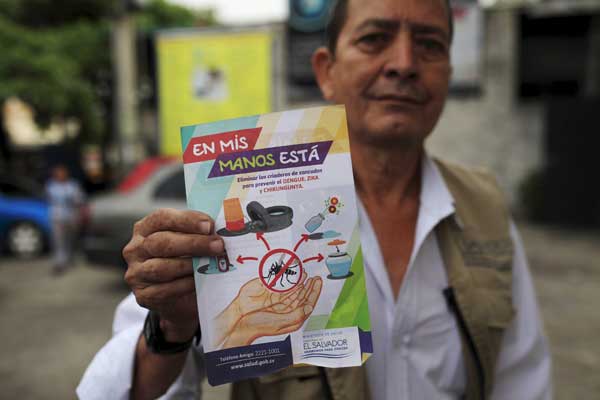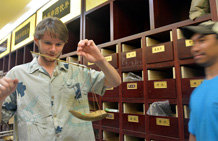
WHO estimates up to 4 mln infected by Zika virus in the Americas
Source:Xinhua
Updated: 2016-01-29
 |
|
A health worker shows a flier used to explain people how to prevent Dengue, Chikungunya and Zika viruses in San Salvador, El Salvador January 28, 2016. [Photo/Agencies] |
GENEVA -- Following World Health Organization's (WHO) decision on Thursday to convene an emergency committee on the Zika virus situation, unit chief for International Health Regulations epidemic alert and response Sylvain Aldighieri said: "We expect huge numbers of infections, some detected and others undetected."
Based on dengue epidemiology in the Americas and the over 2 million cases which are reported in the region every year, Aldighieri estimated that there could be "between 3 and 4 million cases of Zika infections in the Americas."
First isolated in 1947 from a monkey in Uganda, the Zika virus was limited for decades to a narrow equatorial belt stretching across Africa and Asia, rarely affecting humans.
In 2007, the virus breached its geographical range as the first documented outbreak was recorded in the Pacific Islands.
The situation since has drastically changed. In 2015, the mosquito-borne virus was detected in the Americas with Brazil reporting its first case in May last year.
Zika infections have now been reported in 23 countries and territories in the region.
"We must use dengue dynamics as our reference point. Where you had a dengue outbreak in previous years and the mosquito aedes aegypti is still present, you have a risk of zika transmission," Aldighieri highlighted.
According to data, only around one in four infected individuals develop symptoms which include fever, rash, joint pain and conjunctivitis.
"Most of the cases don't present many clinical signs. 75 percent of patients infected by the virus will not develop any clear symptoms, or not enough to go to the clinic and see a doctor," Aldighieri said.

World Family Summit
The World Family Organization was founded in Europe in 1947 and headquartered in Paris.
Link: China's Central Government / World Health Organization / United Nations Population Fund / UNICEF in China
Copyright 2014 National Health and Family Planning Commission of the PRC All rights reserved






